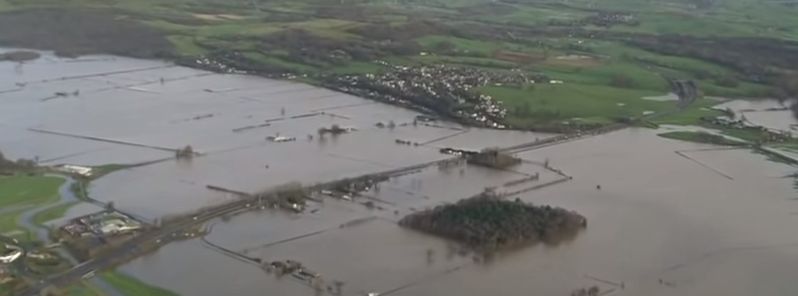Water-saturated Cumbria floods again as persistent heavy rains continue across UK

Persistent flooding continues in the county of Cumbria, northern England, enhanced by another round of heavy rainfall which battered the country on December 9, 2015. This is the third major flood reported in the region in the last 10 years.
Water-saturated grounds and rivers in Cumbria have barely started to recover from record-breaking heavy rainfalls brought by Storm "Desmond", when another storm hit the area.
The village of Glenridding was immersed in flooding waters on December 9, after the river overflew its banks on two places. In the period between December 4 and 5, the village remained cut off for several days and residents have barely begun the clean-up operations in the area.The Glenridding bridge was closed and roads around Cumbria have been drowned in waters.
Heavy rain forecast for flood-ravaged Cumbria https://t.co/d6ALVkWmYm #UKfloods #climateroundup pic.twitter.com/qMuvzjBW1I
— Energydesk (@Energydesk) December 9, 2015
The local police in Cumbria County warned the citizens to remain indoors on December 10: "Cumbria Police would like to urge the people of Glenridding to stay inside their properties to keep themselves and their families safe. Earlier the river water spilled over the banks into the village. The flood water is now starting to slowly recede in Glenridding. A multi-agency presence including the Police, Military, Fire Service and Mountain Rescue Team are in the village providing support and assistance to the residents."
One severe flood warning remains in place, for the River Wyre at St. Michaels South in Lancashire, Floodlist reported. 13 flood warnings and 54 flood alerts for England and Wales are also still in effect, as of December 10.
#Glenridding HUMAN CHAIN needed to rescue people in floods https://t.co/oZG0c9X2at via @MailOnline @cumbriaweather @cumbria #LakeDistrict
— Chris J Coates (@ChrisJCoates) December 10, 2015
"The UK has experienced a very wet November this year, helping to saturate the ground and exacerbate conditions ahead of the weekend’s intense rainfall. In November alone, the Northwest England has had more than double its normal rainfall levels, while southern Scotland and Northern Ireland has received around 147% and 164%, respectively, of their monthly rainfall average," said Maurizio Savina, flood risk expert at RMS, a catastrophe risk modeling company.

Video credit: BBC News
The UK's Met Office has explained why the catastrophic flooding between December 4 and 6 occurred: "The weekend’s record rainfall was associated with a persistent, south-westerly flow bringing a ‘river of moisture’ from as far away as the Caribbean and the Gulf of Mexico. Ocean temperatures in the West Atlantic are currently well above normal and may well have contributed to the very high levels of moisture in the air masses which unleashed rainfall on the Cumbrian fells."
Since 2000, five of the six wettest years on record have taken place in Great Britain, the Association of British Insurers reported. The latest heavy rainfalls across the recently flood-stricken areas resulted in a major flooding for the third time in the last 10 years.
"It’s too early to say definitively whether climate change has made a contribution to the exceptional rainfall. We anticipated a wet, stormy start to winter in our three-month outlooks, associated with the strong El Niño and other factors," Professor Dame Julia Slingo, Met Office Chief Scientist explained.
£50m fund announced by Chancellor George Osborne for those affected by floods in Cumbria and Lancashire https://t.co/deJKfCb11s
— BBC Breaking News (@BBCBreaking) December 9, 2015
"However, just as with the stormy winter of two years ago, all the evidence from fundamental physics, and our understanding of our weather systems, suggests there may be a link between climate change and record-breaking winter rainfall. Last month, we published a paper showing that for the same weather pattern, an extended period of extreme UK winter rainfall is now seven times more likely than in a world without human emissions of greenhouse gases," Slingo explained.
A sum of additional £51 million will be provided to support the affected households and businesses in Cumbria and Lancashire, the UK Government announced on December 9.
The provided financial support is expected to aid the affected regions in completing the damage assessment to the local highway and used to put the flood defense systems back on. Additional £10 million will be given through the Environment Agency for repairing the damaged defenses.
Featured image: Helicopter journey over flooded Cumbria, December 7, 2015. Image credit: BBC News

Commenting rules and guidelines
We value the thoughts and opinions of our readers and welcome healthy discussions on our website. In order to maintain a respectful and positive community, we ask that all commenters follow these rules.